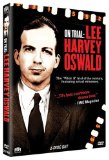| Reviews & Columns |
|
Reviews DVD TV on DVD Blu-ray 4K UHD International DVDs In Theaters Reviews by Studio Video Games Features Collector Series DVDs Easter Egg Database Interviews DVD Talk Radio Feature Articles Columns Anime Talk DVD Savant Horror DVDs The M.O.D. Squad Art House HD Talk Silent DVD
|
DVD Talk Forum |
|
|
| Resources |
|
DVD Price Search Customer Service #'s RCE Info Links |
|
Columns
|
|
|
On Trial: Lee Harvey Oswald (2-Disc Special Edition)
"The only truth in this case is that nobody knows the truth."
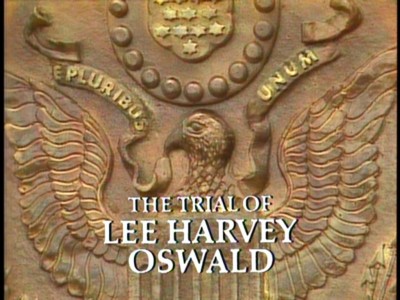
MPI and Granada International have released On Trial: Lee Harvey Oswald, the 1986 mock trial of Oswald conducted by prosecutor Vincent Bugliosi and defense counsel Gerry Spence. Edited down to a 5 ½ hour running time, On Trial: Lee Harvey Oswald originally appeared here in the States on the Showtime cable outlet, where, when I first saw it, it seemed quite original. Now, with thousands of hours of Court TV under our belts, On Trial: Lee Harvey Oswald seems less interesting from a production standpoint, but it may still offer interest to JFK assassination conspiracy enthusiasts.
In 1986, attorney Vincent Bugliosi, the celebrated attorney who successfully prosecuted Charles Manson, was approached by London Weekend Television to participate in a filmed trial of Lee Harvey Oswald, the accused assassin of President John F. Kennedy. No actors were to be used in the trial, with the jury consisting of real Dallas citizens, and the courtroom presided over by Federal U.S. Judge Lucius D. Bunton III. Defending Oswald (who would not be enacted by a performer; a large photo blow-up of Oswald sits in the defendant's chair) would be Gerry Spence, the noted criminal defense attorney who won a judgment in the Karen Silkwood case, and who, before he retired, had never lost a criminal case in his 50 year career. Actual participants and witnesses to the events of November 22, 1963 were to be sworn in and cross-examined. And most importantly, there would be no script. Events would unfold as in a real trial, with Spence and Bugliosi free to examine witnesses as they saw fit.
The two-disc set opens with a short filmed introduction by former NBC news reporter Edwin Newman, who, speaking from Dealey Plaza, gives a brief overview of the crime, as well as informing the viewer how the mock trial will work. Then, for the next five and half hours (edited down, apparently, from over 21 hours of actual trial time), we see Bugliosi and Spence battle it out in the courtroom, with Bugliosi presenting his case first, obviously, and then on disc two, Spence outlining the defense of Lee Harvey Oswald. The direction, if it can be called that, is spare. The courtroom is covered by multiple cameras which record the lawyers and witnesses dispassionately, and what "drama" results, comes from the editing of the footage and of course, the "acting" of the highly entertaining-to-watch attorneys (the cross-examination by Spence of Mrs. Ruth Pane is a terrifically suspenseful bit of editing here).
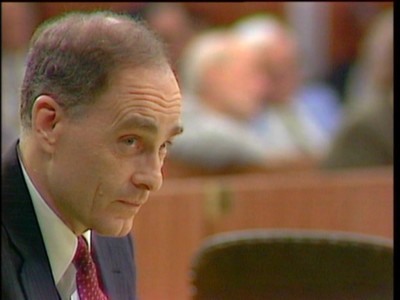
I vaguely remember catching On Trial: Lee Harvey Oswald on Showtime back in 1986, but I don't have a clear memory of its run-time (so I have no idea if this 5 ½ hour version is an extended cut). I do remember thinking how novel it was (back in those pre-cable, pre-Court TV O.J. Simpson murder trial days) to actually see an extended courtroom trial - regardless of whether or not it was legally constituted - that didn't originate in a movie. I would imagine most movie fans would cite Anatomy of a Murder or The Verdict, or possibly Judgment at Nuremburg, as favorite court-room dramas that spend a lot of time in court, but watching On Trial: Lee Harvey Oswald back in 1986 was intriguing because this, apparently, was how a real trial went down (I suppose one could count the Army-McCarthy or Watergate hearings as TV predecessors, but they weren't technically "trails."). If you didn't have any experience yourself of sitting in the dock, or witnessing a trial down at your local county court house, On Trial: Lee Harvey Oswald was a bit of an eye-opener back in 1986.
Of course now, such extended courtroom coverage is nothing special, particularly after the many weeks of the gavel-to-gavel coverage of the O.J. Simpson trial, so On Trial: Lee Harvey Oswald doesn't look all that special now. In fact, knowing that the trial footage actually ran over 21 hours for this mock-up, one can readily see where cuts were made in testimony, as well as getting a sense where tangents suggested by attorneys are not then followed up. I suppose as well one could argue that On Trial: Lee Harvey Oswald is basically worthless because...Lee Harvey Oswald isn't present. Regardless of the efforts to appear technically as true-to-form as possible for a real trial of the assassin of JFK, this is, in the end, just play-acting. Nothing that happens in On Trial: Lee Harvey Oswald can be considered conclusive if you realize that Oswald's absence largely negates the efforts. There are just too many variables at stake to point to the eventual verdict in On Trial: Lee Harvey Oswald as conclusive.
That being said, On Trial: Lee Harvey Oswald is valuable as an historical record for assassination buffs looking to see witnesses to the JFK murder - many of them now notable to conspiracy hounds - under oath (are they really truly under oath, though, since this trial isn't legally mandated?) and cross-examined by two legal sharks. That's when On Trial: Lee Harvey Oswald gets interesting. Several of the witnesses presented, including Dr. Charles Petty (a forensics expert for the House's 1977 examination of the assassination), Mrs. Ruth Pane (who was friends with the Oswalds - exactly who is she, though, really???), Bill Newman (who was 15ft away from the President when the fatal head shot was delivered), Dr. Cyril Wecht (who, it seems, has been on every conspiracy documentary ever made), and Paul O'Connor (the Navy corpsman who says the autopsy of JFK was faked), have become almost legendary to conspiracy theorists, and seeing them testify here, under withering cross-examination, is a healthy way to revisit their oft-told stories.
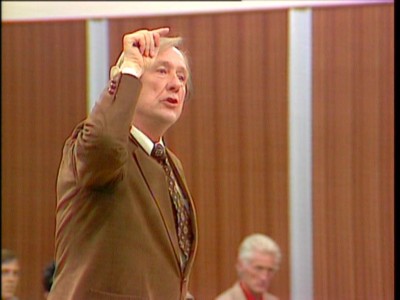
And watching the two attorneys play mind-games on each other, while approaching the trial from two very different styles of lawyering, is fascinating, as well (and let's not forget Judge Bunton, who's a hoot when he tells Spence to "keep on your feet" when he's talking to him). Both are taking this exercise in historical reinvention seriously. Bugliosi, all intensity and sharpish, snappish wit and scorn (and with that rather unpleasant, insistent, high-pitched voice that goes right through a witness), plows through fact after fact, laying out his case with the precision of a surgeon. Obviously, preparation is Bugliosi's forte. His basic take on the conspiracy is that the evidence is overwhelming to put the gun in Oswald's hand, and that theories to the contrary (such as conspiracy theories) are not properly supported by the evidence at hand. Spence, on the other hand, the master jury manipulator, is all honeyed tones and empathetic smiles - hiding an equally precise technique - as he appeals to the emotional side of the case. Frequently speaking like an avuncular uncle chewing the fat with an old friend, Spence's folksy act can't quite conceal that shrewd, almost cold look in his eyes when he turns away from the jury's sight, contemplating his next four chess moves ahead. His theory concerning the assassination is that no one can really place Oswald at the scene, and that far too many opportunities for conspiracy exist for anyone to categorically state Oswald is guilty beyond a reasonable doubt.
Watching On Trial: Lee Harvey Oswald, I tried to put aside my own feelings concerning the case (my feeling -which I'm sure is no different than many peoples' - is that Oswald was directly involved in some fashion, but certainly as a cog in a greater conspiracy), but to be honest, both attorneys were so skillful, I found myself leaning both ways whenever one lawyer made a particularly good point. Overall, I found Bugliosi's argument that Oswald was indeed the shooter compelling, but not his insistence on the validity of the "magic bullet" theory (which, in my unscientific opinion, has got to be one of the looniest stories I've ever heard - particularly how that largely unmarked bullet found its way to be conveniently lying on Governor John Connally's stretcher at Parkland Hospital). Likewise, Spence's argument that Oswald was connected to just about every group possible who had a dog in this race (the FBI, the CIA, the Mafia, and I'm sure, eventually one day, the Girl Scouts of America) is pretty solid, but his insistence that Oswald wasn't one of the shooters, is fairly weak. Frankly, I wasn't surprised by the verdict, although I was surprised by a poll result given by the jury after the verdict was delivered (don't worry; I won't spoil it for you). However on second thought, considering how compelling both attorneys were, I wouldn't have been surprised if either verdict had been handed down here.
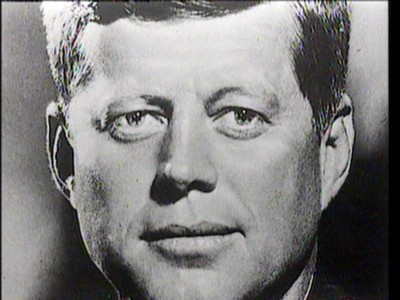
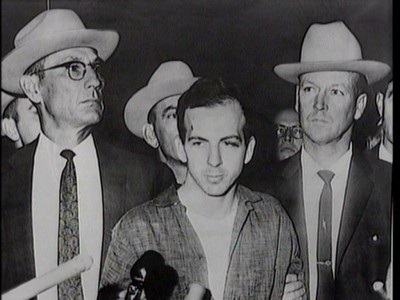
The DVD:
The Video:
The full-frame, 1.33:1 video transfer for On Trial: Lee Harvey Oswald is just okay, considering this mock trial was shot on video. Don't expect Star Wars digital clarity, and you'll be fine (especially if you're used to that old, slightly washed-out, slightly burnt-out VHS look, circa 1986).
The Audio:
The English mono audio track is perfectly adequate for this kind of presentation; any variations in levels come from the original source miking. English subtitles are provided.
The Extras:
There are no extras provided for On Trial: Lee Harvey Oswald. Too bad; some modern context would have been nice for this 22-year-old document.
Final Thoughts:
I'm no expert on the Kennedy assassination by any stretch, but I found On Trial: Lee Harvey Oswald pretty engrossing viewing, regardless of its worth as an historical document. Bugliosi and Spence make an entertaining pair of legal combatants, and the parade of real-life witnesses to the assassination get a work-out in their cross-examinations. Honestly, I would have liked to have seen all 21 hours of the trial, but we get the general gist of what's going on here. I recommend On Trial: Lee Harvey Oswald.
Paul Mavis is an internationally published film and television historian, a member of the Online Film Critics Society, and the author of The Espionage Filmography.


|
| Popular Reviews |
| Sponsored Links |
|
|
| Sponsored Links |
|
|
| Release List | Reviews | Shop | Newsletter | Forum | DVD Giveaways | Blu-Ray | Advertise |
|
Copyright 2024 DVDTalk.com All Rights Reserved. Legal Info, Privacy Policy, Terms of Use,
Manage Preferences,
Your Privacy Choices | |||||||









